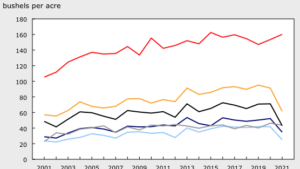Industry News
People News
Pickseed has appointed John Patton as vice-president of international sales for the Pickseed Companies Group. Patton brings over 25 years of in-depth industry knowledge to his role expanding Pickseed’s business in these strategic growing markets.
Mark Wales has been elected president of the Ontario Federation of Agriculture. A long-time board member and industry leader, Wales brings an extensive portfolio of experience to his new position. Joining Wales on the executive are Don McCabe and Debra Pretty-Straathof and returning executive member Keith Currie. Wales plans to work with all agri-food partners, including commodity groups, OFA members, the general public and industry organizations, to achieve results.
CropLife Canada has appointed Pierre Petelle as vice-president of chemistry. Petelle joined CropLife Canada in June 2008 as the director of regulatory affairs and non-ag uses. Prior to joining CropLife Canada, Petelle worked with Health Canada’s Pest Management Regulatory Agency and in the structural pest control industry.
Product News
Pioneer Hi-Bred, a DuPont business, has received Canadian Food Inspection Agency approval of Optimum AcreMax XTreme insect protection, which integrates all of a corn grower’s above- and below-ground insect control and refuge needs in a single bag. Optimum AcreMax XTreme products will be introduced into the Canadian market in the 2013 planting season. Optimum AcreMax XTreme products integrate 95 per cent of a Pioneer brand corn hybrid containing Herculex XTRA insect protection pyramided with YieldGard Corn Borer insect protection and the AgriSure RW trait and five per cent of a similar non-Bt hybrid with herbicide tolerance to serve as the integrated refuge. Optimum AcreMax XTreme products will be offered in addition to the already available single-bag Optimum AcreMax above-ground insect protection and refuge product line.
The Canadian Food Inspection Agency has approved a new, liquid formulation, nutrient seed treatment for use on wheat, oats, barley and corn. Awaken ST is manufactured by Loveland Products and available from UAP Canada Inc., as part of its nutritional portfolio of products. Awaken ST is a patented, seed-applied nutrient, with a micronutrient package including five per cent zinc plus boron, copper, iron, manganese and molybdenum. “Awaken ST puts nutrients where a germinating plant needs them―on the seed,” says Eric Gregory, product manager with UAP Canada Inc. “It’s a unique, nutrient-based product that helps develop a larger, more extensive root system, quicker emergence, greater plant biomass and improved plant health and vigour.” Unlike other registered seed-applied nutrients, Awaken ST comes in an easy flowing liquid formulation that can be applied using traditional seed treating equipment.
Business News
In a move to bring the full identity preserved soybean value chain together, PRO Seeds Marketing, Hendrick Seeds, Hendrick AgriFoods and Agworks have merged. The birth of Sevita International brings together the development of premium soybean genetics, seed varieties and export brands to deliver the benefits of a fully-integrated value chain to farmers and end-users alike. The company will now operate as Sevita International, with their domestic seed marketing arm continuing under the PRO Seeds brand. Sevita International will focus on being market-driven in the development of superior non-GMO food-grade soybeans to strengthen their leadership position in identifying and serving growing export market opportunities for Canadian soybean producers.
Wolf Trax has completed an overhaul and equipment upgrades to its manufacturing facility for plant nutrition products, as the company prepares to meet increased demand in 2012. The work to the manufacturing and packaging equipment will help ensure steady production during peak periods and increase manufacturing capacity at the facility.
The Western Grains Research Foundation is set to receive approximately $1.3 million from the Canadian Pacific Railway Company. The Canadian Transportation Agency ruled that the CP’s revenues for the movement of western grain exceeded its revenue cap for crop year 2010-2011. The agency has also ruled that the revenues from the CP’s grain transportation for the same period were below its cap.
Archer Daniels Midland Company plans to build a 265 million litre biodiesel plant in Lloydminster, Alta., which will increase ADM’s North American biodiesel production capacity by 50 per cent. The biodiesel plant will be located adjacent to the company’s existing canola crushing facility in Lloydminster, which will help optimize ADM’s agricultural origination, transportation and processing assets in Canada. Biodiesel produced at ADM’s facility in Lloydminster will help fulfill Canada’s renewable diesel mandate. Since July 1, 2011, all diesel fuel and heating oil sold in Canada must contain at least two per cent biodiesel. Construction on the facility will commence in spring 2012, and be completed in the fourth quarter of calendar year 2013.
Ontario-based Performance Plants Inc. and Biocentury Transgene (China) Co. Ltd. have signed a commercial license agreement, giving Biocentury the exclusive rights to PPI’s Heat and Drought Tolerance Technology in cotton in China. With this agreement, Biocentury will be able to incorporate PPI’s ground-breaking HDT technology into their market-leading Bt-cotton seeds in China. This is a mutually beneficial agreement as it will help to enhance Biocentury’s competitiveness in product offering and also facilitate the commercialization process of technologies that are discovered and validated through PPI’s robust gene-based technology development.
Industry News
According to a new market research report, “Seed Treatment Market Trends and Global Forecasts (2011-2016),” published by MarketsandMarkets, the global seed treatment market is the fastest-growing segment of the crop protection market. The report says that chemical seed treatments currently control over 98 per cent of the global seed treatment market, while bio-control seed treatments are a smaller market segment, but expected to grow at a faster pace than any other segment, due to government encouragement to reduce agrochemicals usage. The global seed treatment market reached over $2250.0 million by the end of 2010, and is expected to reach $3430.3 million by 2016, growing at a CAGR of 13.5 percent from 2011 to 2016. The North American market is expected to hold 22 per cent of the global market share by 2016, at an estimated CAGR of 16.4 per cent due to higher acceptance of GM seed for soybean and maize/corn.
Canadian flax producers can reap the benefits of an innovative project to create eco-friendly bio-composite products using flax fibre thanks to an investment from the Government of Canada with an investment of more than $33,000 to Open Mind Developments. With this investment, Open Mind Developments created a formula using flax straw to develop a smart phone case through an injection moulding process. The results of this project will allow farmers to earn extra income from waste flax straw, and could create additional processing and manufacturing jobs.
Agriculture and Agri-Food Canada is investing $575,000 to the Canadian malting barley industry to expanding market opportunities. This AgriMarketing investment will enable the Canadian Malting Barley Technical Centre, the Malting Industry Association of Canada and the Brewing and Malting Barley Research Institute to maintain existing markets through activities including technical marketing, communications and the development of a Canadian Malt Barley Brand.
The Government of Canada is investing more than $85,000 to the Canadian Forage and Grassland Association to enhance the competitiveness of forage farmers internationally. This investment will enable the CFGA to develop promotion and information packages for international buyers, prepare market development display materials and participate in international trade shows. These efforts will help the CFGA establish new business contacts and create new export opportunities to increase farmer profitability.
Weed scientists from Agriculture and Agri-Food Canada have completed evaluations on samples of kochia (Kochia scoparia) collected from three fields in southern Alberta last August and have confirmed the first case of a glyphosate-resistant weed in Western Canada. Two weed species in Canada, both found in southwestern Ontario, were previously confirmed as resistant. Giant ragweed was confirmed as resistant in 2009 and Canada fleabane was confirmed as resistant in 2011. Glyphosate-resistant kochia populations have previously been confirmed in Kansas, Colorado and Nebraska. There are also suspected cases being investigated in North and South Dakota and Montana.
The Saskatchewan Government has announced a record $8.3 million in crop-related research funding from the Saskatchewan Agriculture Development Fund. The funding is being awarded to 34 crop-related research projects in 2012 which include the following:
- improving yields and disease-resistance in wheat, barley and flax;
- increasing lentil yields and marketability through fertilization and genetic analysis;
- studying infrared technology to screen out fusarium-infected wheat and barley seeds;
- nutritional and quality analysis of peas, oats and saskatoon berries;
- increasing profitability for wheat and lentil producers through genetic developments;
- reducing yield losses in pulse crops due to drought;
- increasing flax seed size to improve yields;
- identifying clubroot resistant genes in canola; and
- identifying factors that cause blackleg disease in canola.
Optimism among Canadian agriculture producers and agribusiness owners is at an all-time high, according to the fifth annual Farm Credit Canada national Vision Panel Survey. A full 80 per cent say that their farm or business will be better off in five years―a shift from 76 per cent in 2010. Further evidence of this optimistic attitude is demonstrated in additional survey findings which show the following;
- more Canadian producers report being better off today than they were five years ago—77 per cent compared to 67 per cent in 2010;
- 58 per cent of producers plan to expand or diversify their operations within the next five years; and
- seven in 10 producers would encourage a friend or relative to pursue a career in primary production.
Through its “In Search of the Optimal Marketing Structure” study, the Western Barley Growers Association has consulted with all sectors of barley’s domestic and export supply chains. The study is gathering information to put forward recommendations for the best commercial model for Western Canada’s newly deregulated barley marketplace. The study is finding that Western Canada has a number of unmatched strengths in barley. For example, its production, storage and handling infrastructure is second to none, and it is one of the world’s best producers of high-quality barley. In addition, western Canadian producers could capitalize on the demand for mid-range quality malting barley and high-quality feed barley.
On a recent trade mission to China, Prime Minister Stephen Harper and Chinese Premier Wen Jiabao signed new joint initiatives and renewed existing bilateral initiatives between the two countries in several areas, including agriculture. Initiatives in agriculture include joint research that aims to create a stable trading environment with China for Canadian canola seed. In addition, as part of this trade mission to China, Tongwei Co. Ltd., a major Chinese feed company, intends to increase its purchase of Canadian canola meal by up to $240 million annually by 2015. Tongwei believes their imports of Canadian canola could rise to $900 million over the next decade.
Global adoption of biotech crop technology continues at unprecedented rates. During 2011, an additional 12 million hectares were planted, representing an annual growth rate of eight per cent over 2010, according to Clive James, author of the annual biotech crop report released by the International Service for the Acquisition of Agri-biotech Applications. During 2011, 160 million hectares were planted (up from 148 million in 2010) by 16.7 million farmers in 29 countries, including 19 developing countries and 10 industrial countries. Such adoption represents a 94-fold increase in hectares planted since 1996, making biotech crops the fastest adopted crop technology in recent history.











